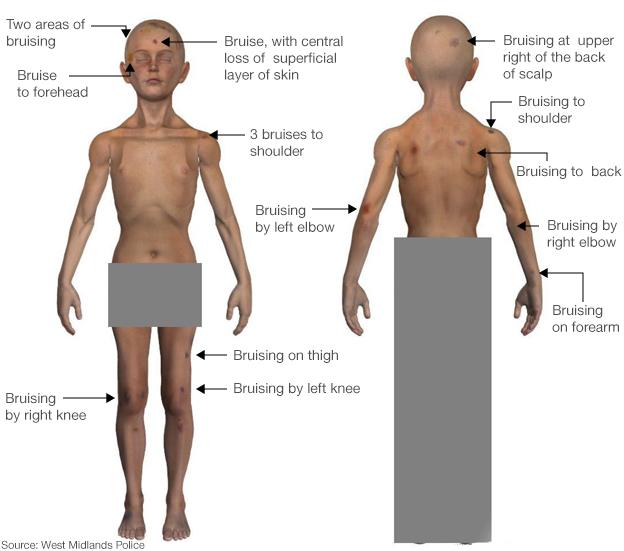Starved boy Daniel Pelka 'invisible' to professionals
- Published
The BBC's Alison Holt explains the report's findings
Chances were missed to help a child who was murdered by his mother and her partner after suffering "terrifying and dreadful" abuse, a report has found.
A serious case review found Daniel Pelka, four, was "invisible" at times and "no professional tried sufficiently hard enough" to talk to him.
He was starved and beaten for months before he died in March 2012, at his Coventry home.
The review said "critical lessons" must be "translated into action".
Magdelena Luczak, 27, and Mariusz Krezolek, 34, were told they must serve at least 30 years in jail, after being found guilty of murder at Birmingham Crown Court in July.
'Shocking reading'
The court heard Daniel saw a doctor in hospital for a broken arm, arrived at school with bruises and facial injuries, and was seen scavenging for food.
A teaching assistant described him as a "bag of bones" and the trial heard he was "wasting away". At the time of his death the schoolboy weighed just over a stone-and-a-half (10kg).
Much of the detail that emerged in the trial about the level of abuse Daniel suffered was "completely unknown" to the professionals involved, the review found.
No-one has been disciplined as a direct result of Daniel's death.
The report by Ron Lock did not blame or identify any individual agency but he said the professionals involved were "too optimistic" about what they saw.
"Workload was a potential issue - child protection is a very complex matter - and perhaps when they felt reassured they moved on to the next case," Mr Lock told BBC News.
"But they need to be stronger and have a much more inquiring mind. They needed to act on what was in front of them."
The review's key findings include:
Police were called to 26 separate incidents at the family home, many involving domestic violence and alcohol abuse
Excuses made by Daniel's "controlling" mother were accepted by agencies
Professionals needed to "think the unthinkable" and act upon what they saw, rather than accept "parental versions"
Daniel's "voice was not heard" because English was not his first language and he lacked confidence
No record of "any conversation" held with Daniel about his home life, his experiences outside school, or of his relationships with his siblings, mother and her partners
None of the agencies involved could have predicted Daniel's death
There were "committed attempts" by his school and health workers to address his "health and behavioural issues" in the months before his death
But "too many opportunities were missed for more urgent and purposeful interventions"
Two of those chances were when Daniel was taken to an accident and emergency department with injuries
Bruises
In March 2008, when Daniel was eight months old, he was treated for a minor head wound. In January 2011, when he was three-and-a-half, he was taken to A&E with a fractured arm.
The review said the hospital "rightly raised immediate concerns about the [fractured arm]" and a meeting was held to decide if it was caused by a fall from a settee, as Daniel's mother claimed, or was the result of abuse.
The meeting decided Luczak's explanation was "plausible".
But the review said the reasons for other bruises found on Daniel at the time, which his mother claimed came from bicycle accidents, were not "fully explored".
The Children and Families Minister Edward Timpson said the report made "shocking reading" and "laid bare" the lack of intervention by professionals.
Mr Timpson said he had written to the Coventry Safeguarding Children Board asking for a clearer analysis as to why the mistakes occurred.
'Invisible' Daniel
Amy Weir, the board's chair, said she found the report "disheartening, disappointing and generally worrying".
Ms Weir said the idea of Daniel being "invisible" was "at the heart of this case".
"I think for Daniel there's something which we've never fully been able to get to grips with," she said.
"The issue about Daniel mainly being Polish speaking" should have been overcome and there were "significant issues" about his mother and her ability to try to "hoodwink the professionals", she added.
Assistant Chief Constable Garry Forsyth, of West Midlands Police, said: "We accept that Daniel was not 'given a voice'."
He said the report "raised the lack of consistency" in officers dealing with separate domestic abuse reports and the force needed "a more holistic approach".

The report said that due to such inconsistency, Daniel's lack of language and low confidence was not picked up and would have made it "almost impossible for him to reveal the abuse he was suffering".
"Overall, the 'rule of optimism' appeared to have prevailed," it said.
The review said Daniel could have been offered greater protection if the professionals involved had applied a "much more enquiring mind".
It also identified school staff did not link Daniel's physical injuries with their concerns about his apparent obsession with food, which his mother claimed was caused by a medical condition.
Gill Mulhall, Daniel's head teacher at Little Heath Primary in Coventry, said: "His mother was a convincing manipulator.

Police were called to several domestic incidents involving Mariusz Krezolek and Magdelena Luczak
"If we were aware of the bigger picture of his life or had doubts about her, we would of course have acted differently.
"We want to see changes where schools are aware of concerns from other agencies which affect our pupils."
Sharon Binyon, medical director of the Coventry and Warwickshire Partnership NHS Trust, believes the service as a whole did not do enough.
"Coventry has one of the lowest numbers of health visitors per child in the country. That was recognised and we're working with NHS England," she said.
"Since the time of Daniel's death the number of health visitors has now doubled and we expect to see it trebled by 2015."
Peter Wanless, the NSPCC's chief executive officer, said ultimately Daniel's mother and her partner were responsible for his death but it was right to look at what could have been done differently.
"Processes were followed correctly much of the time but processes alone do not save children," he said.
Geoffrey Robinson, MP for Coventry North West, described Daniel Pelka's death as "a great disgrace" for the city and called on the council's chief executive, Martin Reeves, to consider his position.
Mr Reeves, said the city had "never faced such a tragic case" and staff needed to "learn quickly" from the review.
"The best legacy for Daniel is to make sure we move forward and I want to have a part to play in that future," he said.
"This can't be about a witch hunt or vilification of professionals."
- Published17 September 2013
- Published17 September 2013
- Published17 September 2013
- Published17 September 2013
- Published17 September 2013
- Published17 September 2013
- Published17 September 2013
- Published17 September 2013
- Published16 September 2013
- Published12 September 2013
- Published2 August 2013
- Published17 September 2013
 NHS boss defends doctor
NHS boss defends doctor
 Coventry Safeguarding board
Coventry Safeguarding board
 Headteacher's statement
Headteacher's statement
 Police admit 'missed opportunities'
Police admit 'missed opportunities'
 Report author lists failings
Report author lists failings